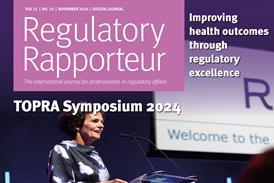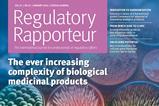‘Operations’ does not quite do justice to the critical role that these individuals play in the global team
If you were to ask any regulatory professional to name a single submission process or procedure that does not involve some kind of electronic data, or document component, the chances are that you wouldn’t be able to find a single individual worldwide. The importance of data and information – with recent developments including identification of medicinal products, real world evidence, and digital application dataset integration – and its management, dissemination into documents for submission, and the filing and retention of those submissions, is now a routine part of our professional lives. However, it wasn’t always this way. Ask those same regulatory professionals if they remember printing, counting and checking thousands of pages of a hard copy marketing application, and you will find more than one!
In this issue of Regulatory Rapporteur, our focus articles examine how these changes emphasise the requirement for regulatory professionals with a dedicated skillset – ie, a regulatory operations function – who can advise on, establish and maintain systems that enable a company to retain critical documents in a controlled way. The regulatory operations professionals work seamlessly with other regulatory colleagues to deliver submissions in compliance with company policies and regulatory requirements without impacting on the company’s ability to react quickly when needed. In this sense, ‘operations’ does not quite do justice to the critical role that these individuals play in the global team. Without them, anything prepared cannot be submitted, and anything submitted cannot be easily stored, located and its outcome(s) tracked. The importance of data can be evident even at early stages where good data and document management can be the difference between a deal being signed or not. Indeed, during time-critical activities such as due diligence, it is much easier to identify, review and assess well-presented documents than a variety of documents which are not easily identified or clearly versioned.
However, the infrastructure required for these activities does come at a price. With many more initiatives resulting in the need for increased data capture, the financial investment required by companies has also grown. There are also, however, associated non-monetary benefits. In this issue, we hear recommendations on streamlining regulatory processes when implementing new regulatory information management systems (RIMS), with the caveat that the system is only as good as the data it contains, and that depends on the people. Again, this reinforces the need for a high-quality regulatory operations function. More than ever, it has become vital to have the right team in place to take on stewardship of the data and also ensure any remedial work that may be necessary over time can be undertaken to ensure that the RIM system continues to perform as needed.
Of course, coming full circle, further change is inevitable…
Of course, coming full circle, further change is inevitable. As such, regulatory operations professionals must keep current with emerging trends, as discussed in our focus article: ‘How data remediation and stewardship is becoming a standard responsibility for regulatory operations professionals.’ These professionals have to monitor the likely future direction of document and data management, expectations of regulators globally, and provide senior management with a critical appraisal of significant developments in an appropriate timeframe to ensure their company’s compliance positions, and its business-critical activities, remain unaffected. In a world as fast-paced as global medical research, this is no mean feat.
In this issue, we also have a range of standalone articles of interest: firstly, a summary of research on challenges faced by industry on prescription-only to over-the- counter switches in the EU, and how those might be overcome – this is a very timely consideration in the post-pandemic, resource- constrained healthcare settings existing in many countries. Our authors also discuss the draft recommendations of the CMDh – on regulatory approaches for medicinal allergen products, with reference to feedback from its consultation. And we also hear current thoughts on the inclusion of elderly individuals in drug development and clinical trials – another issue that is set to become increasingly pressing, given the ageing nature of the global population.
The concerns expressed by our authors in this month’s issue have led us to conclude that, as always, a concerted effort across all regulatory functions is needed; only by doing so will we be able to continue working together in the most time- and resource-efficient manner that evolves in response to our changing environment. In this way, we can avoid unnecessary delays in regulatory submissions and subsequent approvals to facilitate patient access to much-needed treatments. ▪










































